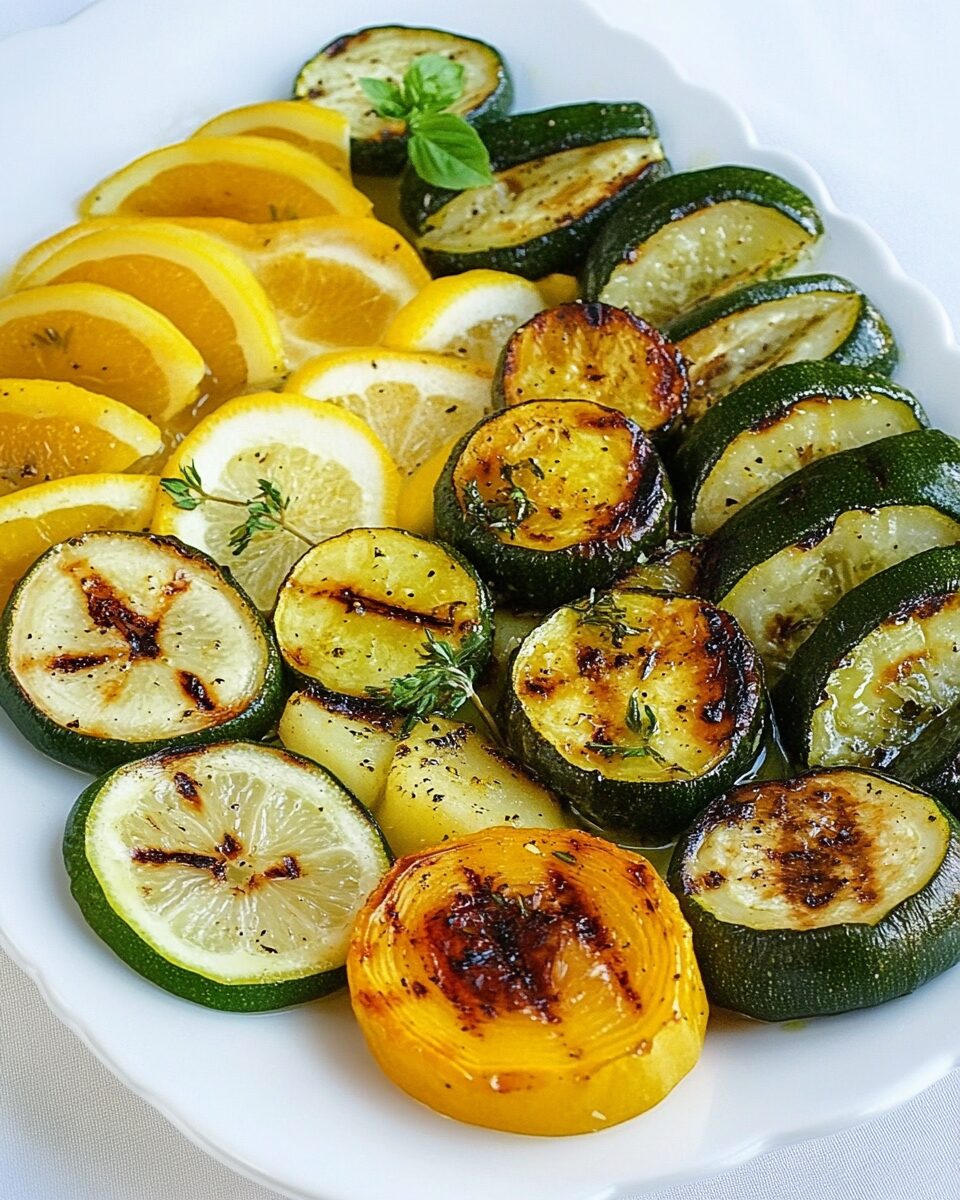A simple yet delicious dish featuring a variety of grilled vegetables, enhanced with a zesty lemon and olive oil dressing. This recipe is perfect as a side dish or light meal, offering a healthy and flavorful option for any occasion.
FULL RECIPE
Ingredients
- 1 zucchini, sliced
- 1 yellow bell pepper, cut into strips
- 1 red bell pepper, cut into strips
- 1 eggplant, sliced
- 1 red onion, quartered
- 2 tbsp olive oil
- 1 lemon, juiced
- Salt and pepper, to taste
- 1 tsp dried oregano (optional)
Directions
- Preheat the grill to medium-high heat.
- In a large bowl, toss the zucchini, bell peppers, eggplant, and onion with olive oil, lemon juice, salt, pepper, and oregano.
- Place the vegetables on the grill and cook for about 5-7 minutes per side, until tender and slightly charred.
- Remove from the grill and serve immediately.
Nutritional Information
- Calories: 150 per serving
- Protein: 2g
- Carbohydrates: 15g
- Fat: 10g
- Fiber: 5g
- Sodium: 300mg
The Health Benefits of Grilled Vegetables
Grilled vegetables are not only delicious but also incredibly nutritious. They retain many of their natural vitamins and minerals because the cooking process doesn’t require much fat, and the vegetables’ flavors are enhanced by the heat. The grilling method helps preserve the nutrients, such as vitamin C, which can be lost in boiling or frying. Grilling also reduces the overall calorie content compared to frying, making it a healthier option.
Why Choose Grilled Vegetables?
Grilled vegetables offer a wonderful, smoky flavor that is not achievable through other cooking methods. Grilling allows the vegetables to caramelize and bring out their natural sweetness, making them a perfect choice for people who enjoy rich, flavorful food but want to keep their meals light and healthy. The addition of lemon and olive oil only enhances these flavors, creating a vibrant dish that can stand on its own or complement a variety of other meals.
The Role of Olive Oil in the Recipe
Olive oil is one of the key ingredients in this recipe, and it offers several health benefits. Known for its heart-healthy fats, olive oil is rich in monounsaturated fatty acids, which can help lower bad cholesterol levels. Olive oil also contains antioxidants like vitamin E and polyphenols, which are known to reduce inflammation in the body. When used in grilling, olive oil helps keep the vegetables moist while adding a rich, flavorful finish.
The Zesty Kick of Lemon
Lemon adds a bright, fresh flavor to the grilled vegetables. The acidity from the lemon juice balances the richness of the olive oil and enhances the natural flavors of the vegetables. Additionally, lemon is packed with vitamin C, an essential nutrient that supports immune function and promotes healthy skin. It’s a perfect pairing with grilled vegetables, giving the dish an extra burst of flavor.
The Versatility of Grilled Vegetables
One of the best aspects of grilled vegetables is their versatility. This recipe allows you to use a variety of vegetables, so you can easily adapt it to suit the season or your personal preferences. Feel free to experiment with different vegetables like mushrooms, asparagus, or cherry tomatoes. You can even add some herbs or spices to change the flavor profile, making it a perfect dish for all seasons.
Grilled Vegetables as a Side Dish
Grilled vegetables make an excellent side dish for a variety of main courses. Whether paired with grilled meats, seafood, or even a hearty grain-based dish, these vegetables complement almost anything. The smoky, charred flavor of the vegetables adds depth to your meal, while the lightness keeps it from feeling too heavy. They’re perfect for barbecues, weeknight dinners, or any occasion where you need a simple yet flavorful side.
Incorporating Grilled Vegetables into a Plant-Based Diet
For those following a plant-based or vegetarian diet, grilled vegetables are a fantastic option to increase your vegetable intake. They can be served as a main dish or used as a filling for wraps, sandwiches, or grain bowls. The combination of healthy fats from the olive oil and the natural nutrients from the vegetables provides a well-rounded, satisfying meal without the need for animal products.
The Benefits of Using Fresh Vegetables
Fresh vegetables are always the best option when grilling, as they have a higher water content, which helps them stay tender and juicy during the cooking process. Fresh vegetables also offer better flavor and texture than their frozen counterparts. When selecting vegetables for grilling, try to choose those that are in season, as they will be at their peak in terms of flavor and nutritional value.
How to Select Vegetables for Grilling
When choosing vegetables for grilling, it’s important to pick varieties that can hold up to the heat without falling apart. Dense vegetables like zucchini, bell peppers, eggplant, and onions work particularly well because they are hearty and retain their texture when grilled. Additionally, vegetables that have a high moisture content tend to grill better, as they won’t dry out too quickly. Always look for vegetables that are firm and free of blemishes to ensure the best results.
Seasonal Variations of Grilled Vegetables
Grilled vegetables can be made year-round, but you may want to adjust your choices based on what’s in season. During the summer, you’ll find an abundance of fresh zucchini, bell peppers, tomatoes, and eggplant, while fall brings sweet potatoes, Brussels sprouts, and root vegetables like carrots and parsnips. By using seasonal produce, you can create a dish that reflects the time of year and supports local farmers.
Using Grilled Vegetables for Meal Prep
Grilled vegetables are an excellent addition to meal prep, as they can be made in advance and stored in the refrigerator for up to a few days. They work well in salads, grain bowls, or wraps, and they can be reheated easily without losing much of their flavor or texture. This makes them a great option for busy individuals who want to enjoy healthy, home-cooked meals throughout the week.
Pairing Grilled Vegetables with Proteins
Grilled vegetables are a great companion to a variety of proteins, including chicken, fish, tofu, and legumes. The smoky flavor of the grilled vegetables complements the savory taste of grilled meats or plant-based protein sources. A squeeze of lemon over both the vegetables and protein can tie the dish together, enhancing the flavors and providing a light, refreshing contrast to the richness of the protein.
The Importance of Salt and Pepper
Salt and pepper are simple yet essential ingredients that bring out the natural flavors of the vegetables. A light sprinkle of salt enhances the vegetables’ sweetness, while pepper adds a bit of heat to balance the acidity from the lemon. Though it may seem basic, the right seasoning is key to transforming a simple dish into something memorable.
The Impact of Grilling on Vegetables’ Nutritional Value
Grilling vegetables is a healthy cooking method because it preserves their nutritional value while imparting a smoky flavor. Unlike frying, which can add unhealthy fats, grilling requires only minimal amounts of oil, helping to keep the overall calorie count low. Furthermore, grilling allows vegetables to retain their water-soluble vitamins, such as vitamin C and B-vitamins, which can be lost through boiling or steaming.
Grilling Techniques for Perfect Vegetables
To achieve perfectly grilled vegetables, it’s important to ensure they’re cooked over the right heat. Too high, and they may burn before becoming tender; too low, and they may become soggy. Medium-high heat is typically ideal for grilling vegetables, allowing them to cook through without becoming charred. Additionally, turning the vegetables halfway through grilling ensures even cooking and a consistent char on all sides.
Using Grilled Vegetables in Salads
Grilled vegetables can be a wonderful addition to salads. They add texture and depth of flavor, making your salad more interesting and filling. Toss grilled zucchini, bell peppers, and onions with some greens, nuts, and a tangy vinaigrette for a satisfying and nutritious meal. The warm vegetables can even help to slightly wilt the greens, creating a more cohesive dish.
The Appeal of Simple Ingredients
This grilled vegetable recipe highlights the beauty of simple ingredients. By focusing on fresh, high-quality vegetables and using just olive oil, lemon, and seasoning, the dish allows the vegetables to truly shine. This simplicity makes the recipe easy to prepare while ensuring that the focus remains on the natural flavors and textures of the ingredients.
Grilled Vegetables as a Quick and Easy Meal
One of the biggest advantages of this grilled vegetable recipe is how quick and easy it is to prepare. With just a few simple steps and minimal ingredients, you can have a flavorful, healthy meal ready in no time. It’s perfect for busy weeknights when you want something light yet satisfying without spending hours in the kitchen.
Enhancing Grilled Vegetables with Fresh Herbs
Fresh herbs can elevate the flavor profile of grilled vegetables. While the recipe calls for oregano, other herbs like basil, thyme, or rosemary can be added for a different twist. Herbs bring freshness and fragrance to the dish, and when paired with the smoky flavor of the grilled vegetables, they create a beautifully aromatic experience.
Conclusion
Grilled vegetables with lemon and olive oil are a simple yet flavorful way to enjoy a variety of fresh vegetables. The combination of smoky grilling, the richness of olive oil, and the zesty brightness of lemon creates a dish that is both satisfying and nutritious. Whether served as a side dish, main course, or part of a larger meal, grilled vegetables offer endless possibilities and can be easily adapted to suit your taste preferences. With its health benefits, versatility, and delicious flavor, this dish is sure to become a staple in your cooking repertoire.






